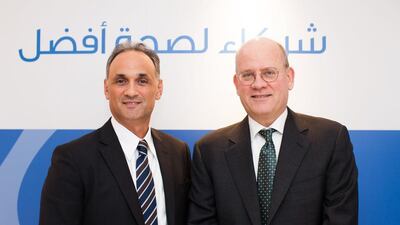GE is working with UAE health chiefs to use private finance to develop radiology departments in hospitals.
The UAE Ministry of Health has signed a deal with GE that would give the US company rights to equip and service radiology departments in 11 hospitals starting this year.
As part of the deal, GE would upgrade and invest in imaging equipment in the hospitals instead of the government.
It would also train the radiologists to use the latest equipment. Its distributor, Abu Dhabi International Medical Services, would manage the departments.
GE would be paid per patient from the insurance companies that work with the ministry. The deal was signed on the sidelines of the Arab Health exhibition that opened in Dubai yesterday.
Radiology departments at the hospitals would be connected to a central hub built by the Ministry of Health. With the teleradiology technology, the radiologists could share diagnostic images between hospitals, saving time and costs. GE expects as many as 30 patients a day, in a large public hospital in the UAE, would use the equipment.
Tumbling oil revenues are leading to greater use of private finance to fund infrastructure projects and run services across the region as governments’ budget surpluses come under pressure.
GE said that the upgrades would be in place this year in the 11 hospitals.
“It would save the ministry the investment in machines – not every hospital has the technician to read the images – and it would save time as well as costs in the long term,” said Maher Abouzeid, the president and chief executive for eastern growth markets at GE.
“No matter where the oil prices are, health care is needed. [The governments] need to do more with less and private-public partnerships will take the burden of health care.”
RadNet, a Los Angeles-based company that operates imaging centres, which is listed on Nasdaq, is also looking to enter the UAE market.
“There are large amounts of money being spent on these but you need the specific expertise in imaging,” said Ranjan Jayanathan, the chief information officer at RadNet.
It wants to focus on hospitals as well as outpatient centres where initial start-up costs are far less than at hospitals.
It is implementing a public-private partnership with Qatar’s Primary Health Care Corporation, which operates 21 primary healthcare centres in the country, to provide screening services, including mammography.
RadNet does not provide equipment but works with a third-party groups, such as Fujifilm Medical Systems in Qatar, to provide them.
Imaging is among the most attractive of healthcare segments in the UAE for operators and providers because of the revenue it generates.
Consumer spending on pharmaceutical products, medical appliances and equipment in the UAE is expected to touch Dh5.03 billion in 2020, up by 9.78 per cent a year from Dh2.87bn in 2014, according to figures from the Dubai Chamber of Commerce and Industry.
Diagnostic imaging was the largest device segment by value in 2014, it said.
ssahoo@thenational.ae
Follow The National's Business section on Twitter

